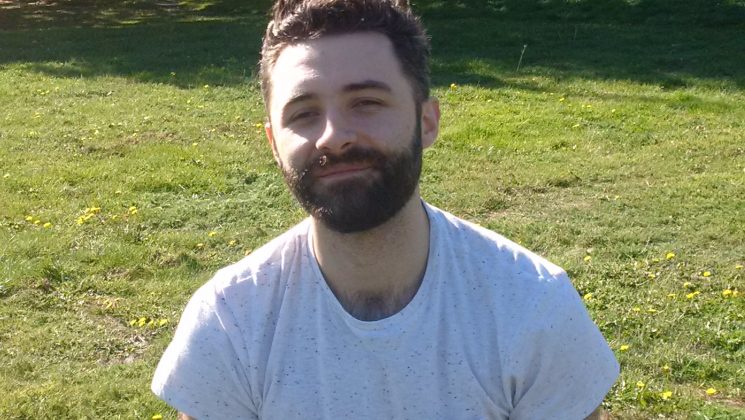Myles Cooper works as an assistant practitioner at Hellesdon Hospital in Norwich part of the Norfolk and Suffolk NHS Foundation Trust. In February 2018, he started his journey on the Nursing Degree Apprenticeship.
How long have you been working at the Trust?
Coming up to nine years now. I first joined on a temporary contract as a support worker on Wittlingham ward, and I obtained a permanent post on Glaven ward about seven years ago.
When did you do your assistant practitioner qualification?
It’s all been a bit of a whirlwind really! I started the AP course in 2016, and then within a couple of months of qualifying I obtained the assistant practitioner post.
So what made you decide to do the nursing apprenticeship?
Probably about 10 years ago I started working in health care, and it was always an objective of mine but it wasn’t logistically possible at the time to undertake nurse training.
So when I saw the opportunity that the Trust was giving to members of staff in terms of the training, the degree, and the possibility of being able to qualify as a nurse from that I thought I’d take the opportunity, as I know that funding from the government can be sporadic.

Picture: NHS Employers/Creative Commons
How did you hear about it?
It was more to do with word of mouth. I spoke to a member of staff at the time who was training with the work-based learning course, which is very similar to the apprenticeship nursing course, so I emailed him and he told me what to expect from the course – what was good, what was difficult. His advice to me was: “You will eat, sleep and breathe nursing!”
So how are you getting on with it? Are you enjoying it?
Yes, I’m learning exponentially! It is tough going being able to manage and organise your workload and you’ll come across challenges, but then you have to try and make them into opportunities.
I’m enjoying being able to learn with University of Suffolk as well because outside of the practical work we’re doing two days of theory every third week.
I think the university are tip top. I couldn’t criticise them at this point about the way they manage their students and the way they manage the expectations, the schedules and the timetables.
They’ve been very resourceful and really good at being able to provide tuition and support. I know some of my colleagues have struggled with passing their assignments and I think on a couple of occasions they’ve not been sure on what they need to improve on, but if you send an email to the course leader she will email back on the same day and will always have a clear answer. So it’s been a really good learning experience and I really appreciate the time that they give us.
Have your colleagues been supportive?
Something that was identified in one of the workshops was about what to do if you’re on a placement and you’re working with people you’re normally working with and they’re treating you the same as they would if you were in your normal job role.
Then there are times when you’re on your own ward and people sometimes expect that you can do things a qualified nurse can do. There have been times where that’s been difficult, and I think you have to be quite assertive and sometimes have to be explicit with people about what it is that you’re doing and what their and your expectations are.
However, my colleagues have really helped me to learn and have been supportive throughout the course and when I have needed a day to study the management have made time.
Did you have any concerns about starting the apprenticeship?
Just passing it! I didn’t know if I would be able to get through the exams!
The distance was one of the things that first came to mind. Going to the university I travel between 50-60 miles to get there so to start with I was a little bit concerned about how manageable that would be. It turns out that it wasn’t a challenge at all. A couple of people on site here go to university with me so we carpool.
The other concern I had was about work-life balance and being able to manage what is technically six days a week alongside everything else. I don’t have any dependents so life isn’t too much of a struggle for me, but I know for some of the people on the course it is a real challenge at times, especially with having families.
Educationally I knew it was a step up from the foundation degree but I guess the support that was given rationalised that.

Hellesden Hospital (geograph.org.uk)
What would you say to anyone thinking of doing it next year? What would your advice be?
You really do see the broader picture, and you’re able to really think critically about what it is you’re doing and why. You do have a lot of opportunities to get to know people from different walks of life and different circumstances – both staff and service users. You’ll get to know the services that support our services as well.
The obvious one is that you’re getting paid to do the job, and you’ll be doing three days a week in your job, and two days a week on placement or at university. Yes, you’ll need to do an extra day of study on top of that – it’s not compulsory, but you would find it difficult to pass the assignments without it.
You don’t take the debt home with you at the end of the course, and it’s all supported by the Trust. If you take the opportunities, are resourceful and willing to learn, then you’ll get the appreciation for it.
The challenges would be that it does take up a lot of your time, but it’s not unmanageable as you get to choose whether you do your extra day’s study time on a certain day or part of a day.
You have to be disciplined in being able to manage challenging situations – both with service users in acute distress, as well as managing relationships and expectations with colleagues. In terms of exams and assignments you need to be confident about raising your hand and asking for help.
With all this in mind though, would I go back a year and decide not to do this? No, it’s a great opportunity.
Why did you decide to join UNISON?
I’ve been a member of UNISON for about seven years now. If you’re a staff member I feel you have rights and they should not be denigrated in any way. Sometimes they can be eroded over time, and if you don’t have that support from a union then your voice can go by the wayside.
It’s good to have someone there to be able to voice your opinions with you, and for you, when you can’t speak for yourself.

